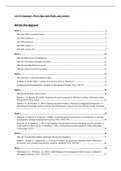Summary
ACCO Summary of all the web clips, info skills and articles
- Course
- Institution
This summary consists of all the web clips, info skills, and articles of the course Acad.Comp. Organization and Strategy (ACCO), fall 2022. PERFECT FOR RESIT.
[Show more]



